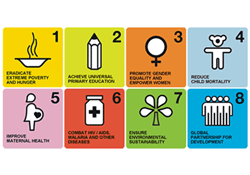Millennium Development Goals

The United Nations Millennium Declaration, adopted in 2000 by 189 nations, embraces a vision for a world in which countries work in partnership for the betterment of all, particularly the most disadvantaged. This vision was transformed into eight Millennium Development Goals (MDGs) and, since then, a total of over 20 targets and 60 indicators. Three of the goals are health-specific, addressing child health (MDG 4) and maternal health (MDG 5) and combating HIV/AIDS, malaria and other diseases including tuberculosis (MDG 6). The other goals address key determinants of health including poverty and hunger, gender equality, environmental sustainability, and global partnership for development.
The MDGs are a historic framework providing focus and accountability in addressing some of the world’s most pressing development challenges. The 53 Member States of the WHO European Region have made some significant advances in meeting the MDGs. Areas remain, however, where action has stagnated and inequities in progress persist between and within countries. With only five years left for the fulfilment of many of the MDG targets – and in light of threats from the food price, economic and financial, and environmental crises – the decision to scale up commitment and action is needed now more than ever before.



